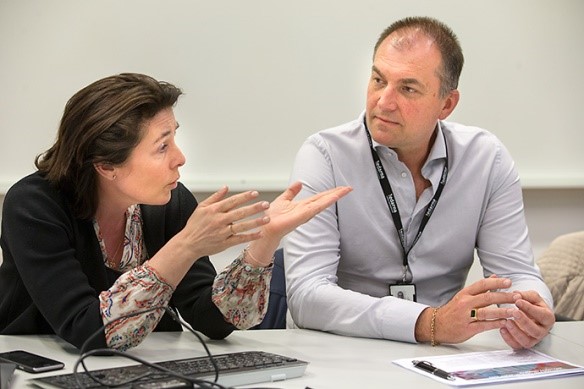At the end of 2008, vehicle manufacturer Scania was threatened by a crisis. The order inflow fell rapidly. In just a few months it had halved, and Scania’s profitability had dramatically reduced. This spurred Scania’s management, together with the trade unions at the company, to initiate intensive efforts to reverse the trend. A starting point in this work was dialogue and cooperation between the company management and the trade unions – a ‘social dialogue’.

To reverse the trend and secure the company’s continued survival, Scania’s management intensified the long-standing dialogue with the trade unions in the autumn of 2008. This resulted in a joint crisis plan to retain and develop core skills at Scania rather than laying off workers. For example, a four-day week was introduced with a 10 per cent salary reduction, and the free time that became available due to reduced production was spent on further education and training for staff.
”Scania has long had a humane company culture, with a lot of respect for the individual. It’s therefore natural to work on social dialogue and to take bring the employees’ ideas and perspectives into our work to develop the company,” says Sofia Vahlne, Head of Labour Affairs at Scania. She continues: ”But we don’t just work on these issues out of the goodness of our hearts. It gives us competitive advantages globally. If we don’t utilise the skills and knowledge of our employees, we’ll struggle to be profitable in the future and to be an attractive employer, which has become increasingly important.”
Ms Vahlne says the social dialogue with the trade unions during the financial crisis led to a solution where Scania, unlike many global competitors, chose not to carry out large-scale layoffs. Once the economy returned to growth, Scania was ready to receive orders at full capacity, with highly trained staff.
”Social dialogue has proven a very effective tool to give us the opportunity and ability to deal with fluctuations in the global economy.”
Scania has a flat organisation where all employees – from managers to shop floor workers – have personal responsibility for developing the company. Processes and working methods are developed and implemented in joint dialogue. Once a week there’s a joint evaluation of work processes, which enables all workers to participate in the company’s development.
”We’re open about the fact that this work will never be complete, and that we seek and welcome improvement suggestions in all areas.”
Most managers at Scania started their careers in the company as trainees and have worked their way up over a long period of time. This means they often share Scania’s values and belief that the employee perspective is an important part of the company.
Scania is a global company and works with social dialogue and similar processes in all countries where it operates. The organisation is adapted to the culture and legal framework of the country in question. In the Netherlands, for example, Scania has work councils, while in India there are committees where the employees are represented. This allows for social dialogue in all countries, regardless of the circumstances.
From the unions’ point of view, there are significant gains from allowing the employees to contribute their expertise and giving them the opportunity to contribute and influence the company’s development. Good relations between employees and corporate management promotes development and profitability. This is in everyone’s interest, according to the four trade unions at Scania: IF Metall, Unionen, the Academics Association of the Swedish Confederation of Professional Associations, and Ledarna.
Cooperation and dialogue provide greater opportunities for employees to participate and influence the company, and to contribute to improvements.
”For social dialogue to work, all parties need to have confidence in each other. This is something that’s developed over time through dialogue and clear cooperation models. Resources are required for it to succeed,” says Lisa Lorentzon from the Academics Association.
Sharing responsibility also means the trade unions need to see new opportunities and try new methods. There are many perspectives in a workplace – from gender equality issues to safety regulations – that can be handled within the framework of dialogue.
”When dialogue works, everyone’s viewpoints have been considered along the way. It subsequently becomes much easier to approve decisions or agreements once they reach decision makers,” says Johan Järvklo from IF Metall.
Corporate management and the trade unions share the belief that in order to be an attractive employer in the future it will become increasingly important for any company to work with social dialogue between management and employees. Simply put: it gives a competitive advantage.
BRIEF FACTS
|
Involved Global Deal Partners
|
Useful links |